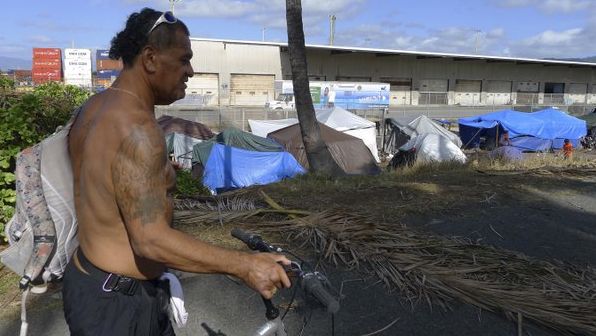A controversial plan to allow homeless Maui residents to legally reside in their cars cleared a significant hurdle Tuesday as the Maui County Council unanimously voted to amend a section of the Hawaii Revised Statutes that currently renders such habitation illegal.
On the second and final reading of Bill 108, the Council agreed to enact an ordinance in accordance with HRS Section 291C-113 temporarily allowing people to use their vehicles “for the purposes of human habitation on County of Maui property.”
The law currently prohibits habitation of any vehicle between 6 p.m. and 6 a.m. while the vehicle is parked on any roadway, street, highway or other public property.
The proposed pilot program would allow people living in cars to park at a designated lot managed by a yet-to-be-determined county department between 7 p.m. and 7 a.m. (or other specified times depending on the location). Users would need to register upon entry to the lot, which would be monitored by county staff.
The program has been proposed one of several stopgap strategies needed to address the County’s burgeoning homelessness problem and alleviate the strain on its limited shelters.
The bill cites the 2016 Hawaii Housing Planning Study, which reported 1,137 homeless people in Maui County, an increase of nearly 19% from the year prior.
“I want to remind folks that some of these homeless people that are living in their cars are paying taxes,” said. Council member Kelly King, who introduced the measure. “They are working. Their kids are going to school. They are involved in our community. They are taxpayers who cannot afford the exorbitant rents.”
Council member Gabe Johnson said being able to stay in a secured vehicle helps to keep homeless individuals and families safe.
“When I’ve gone out and did outreach to houseless folks, some of them sleep with their backpacks on their chest so no one would steal from them,” Johnson said. “(In a car) you can lock your door when you sleep.
“This is just the bare minimum we can do to help our folks until we get a big, robust system of Housing First,” Johnson said. “I’m a Housing First advocate, but the model doesn’t work until we get the housing. I know it’s a slow process for us to get those homes at rates people can afford. Until then, I stand strong in my support of this bill.”
Those who attended the meeting virtually to testify about the bill Tuesday were also unanimous in their support.
“I feel like if we don’t take this step, then we’re not going to figure out how to resolve all the ancillary issues that come up,” said Faith Chase. “ You have a fearless and a committed public and volunteer force and a compassionate body of people who will make sure that those who need this safe sleeping space will find success in it and from there, a lot of beautiful things will grow.”
Lisa Darcy, founder of Share Your Mana, a nonprofit organization that supports homeless individuals, called the measure “historic.”
“This opens up the opportunity for so much safety for community members who have been living in very unsafe and dangerous conditions,” she said. “I’m really looking forward to this moving forward and being able to open up the door to so much opportunity and success for so many people that are unable to because they can’t even sleep in safety.”
Kihei Community Association board president Mike Moran echoed the sentiments.
“We have families where both parents are working, kids going to school, but they can’t afford a place to live so they end up in a car,” he said. “We’re just trying to make it as positive as we possibly can so that people in that situation have a safe place to stay without being disturbed by police officers. They can get a reasonable night’s sleep and then conduct their business the next day.
“We’ve had comments that we need housing,” he continued. “Well, of course we need housing. But we have to do something for these folks now. Until we get a place for them to live permanently, let’s give them any advantage we can to have a place for shelter.”
The version of the bill that was submitted for second reading did not specify whether it was only for Maui residents or for visitors as well. King addressed the uncertainty at the start of the discussion by proposing that the new ordinance specify that it applied exclusively to Maui residents, thereby preempting the possibility of tourists staying in their rental cars rather than renting formal accommodations.
King said she expected a pilot program to move ahead swiftly as county departments have already begun meeting to identify possible lots and establish rules and procedures.



